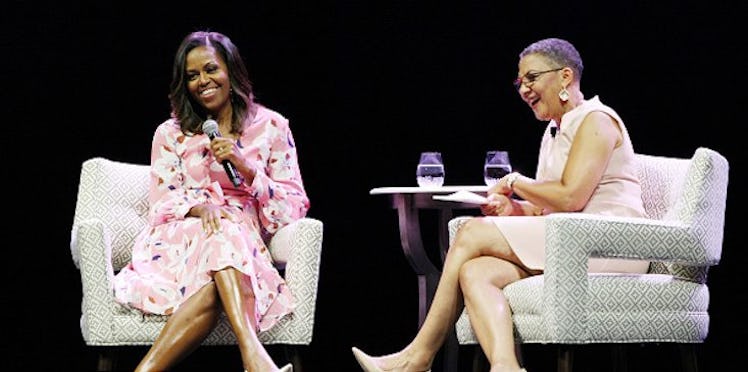
Michelle Obama Opens Up About How Racism Affected Her Time As First Lady
Michelle Obama might have handled her time as the First Lady of the United States like a real-life version of superwoman, thanks to her kick-ass speeches, dresses, and humanitarian causes. But that doesn't mean she never felt down during the eight years she occupied the White House. Michelle Obama recently spoke at the Women's Foundation of Colorado's (WFCO) 30th anniversary event in Denver on Tuesday, where she opened up about how racism affected her during her time as the first lady, according to multiple news outlets.
In case you were wondering, yes, she did catch some of those racist and sexist jokes and yes, they hurt her just like they hurt a lot of women of color.
During her talk, Michelle Obama shared,
The shards that cut me the deepest were the ones that intended to cut. Knowing that after eight years of working really hard for this country, there are still people who won't see me for what I am because of my skin color. Women, we endure those cuts in so many ways that we don't even notice we're cut. We are living with small, tiny cuts, and we are bleeding every single day. And we're still getting up.
Michelle Obama was criticized based on both her race and her gender, which was a different experience from any other first lady in history.
She was called "an ape in heels" in 2016, an animal comparison which has long been a racist association to black people.
In 2008, when Barack Obama first ran for president, The New Yorker magazine ran a cover with an illustration of Michelle Obama holding a rifle with a magazine of bullets, wearing an afro, and fist-bumping her husband.
According to Time magazine, she shared during a 2016 speech at Tuskegee University's graduation commencement,
Now, yeah, it was satire, but if I'm really being honest, it knocked me back a bit.
The rifle and angry expression on Michelle Obama's face seemingly played into the "angry black woman" stereotype that suggests black women are always hostile and aggressive. Such a stereotype is harmful because it often restricts black women from being able to express their full spectrum of emotions, for fear of being seen as an agitator.
The stereotype also leaves room for people to feel like they don't have to protect, feel empathy, or be sensitive to black women and girls since they are "strong" and don't need help. But no matter how strong Michelle Obama and other black women are, we still have feelings that can be hurt and experiences that can be traumatic.
Michelle Obama talked more at the commencement about more racist comments she's heard about her and how she has been able to overcome them, according to Time.
She continued her commencement speech, saying,
Over the years, folks have used plenty of interesting words to describe me. One said I exhibited 'a little bit of uppity-ism.' Another noted that I was one of my husband's 'cronies of color.' Cable news once charmingly referred to me as 'Obama's Baby Mama.' And all of this used to really get to me. Back in those days, I had a lot of sleepless nights, worrying about what people thought of me. It can feel isolating ... I had to ignore all of the noise and be true to myself— and the rest would work itself out.
And it certainly did work itself out. Michelle Obama has become an emblem of class, resilience, and not just strength, but also healthy vulnerability. Even though she and Barack Obama left the White House, many citizens in the country have still been clocking their every move. We've even obsessed over her vacation style and natural hair.
Michelle Obama has been "called everything but a child of God," as the southern elderly might put it, making her the perfect example of how racism affects all black people, no matter high up the social and financial ladders they climb.
Luckily, for every racist comment out there about her, there are plenty of praises given to the inimitable Michelle Obama.
Heck, she's friends with Beyoncé and gives a wicked good rendition of a Missy Elliott song. What exactly is there not to love, people!?